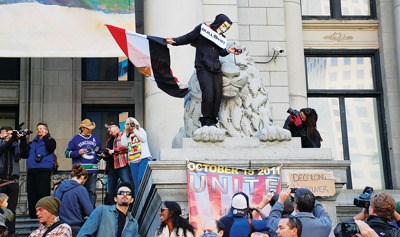One overdose, one overdose death, clashes with police and a pending court injunction have clinched Occupy Vancouvers run as the dominant issue of the municipal election at least according to local headlines.
But when it comes to the minds of prospective voters, Occupy Vancouver is likely not occupying the kind of space the media buzz and election rhetoric would have you believe.
An Angus Reid poll released Monday that showed 75 per cent of Vancouver residents want the camp shut down also highlighted that they dont care all that much about it in the context of the election.
The 402 adult residents of Vancouver who answered an online survey last week ranked Occupy as only moderately important in the great civic scheme of things. Everyday issues such as providing good public sanitation, public safety, the environment and homelessness and poverty outranked the controversial encampment on a list of voter priorities.
Yet those higher-ranking topics seem destined to take a backseat to the Occupy frenzy as Vancouver heads into the home stretch to Saturdays election, says Patrick Smith, professor of political science at Simon Fraser University.
He attributes the hoopla over the tent city to NPA mayoral candidate Suzanne Anton.
Shes been trying to get the mayors attention probably since August, says Smith. After failing to gain traction on issues such as backyard chicken coops and frontyard wheat fields, the underdog finally caught Mayor Gregor Robertsons attention with her hardline stance on ending the Occupy encampment, framing the mayors wait-and-see approach as a lack of leadership.
This one kind of took on a life of its own and the mayor was forced to respond, says Smith.
The ensuing ideological battle over the tent city plays out one of the longest standing election tropes, says Smith, in which a David endeavours to defeat a Goliath over a wedge issue. And despite a wealth of possibilities in Vancouver the Angus Reid poll shows voters may actually care about issues such as homelessness, transit, small business and property taxes neither the NPA nor Vision could resist the gift-wrapped controversy unfolding at the Art Gallery.
Each of the main parties have declared platforms that include stuff on the whole range of things that cities do, says Smith. But partly because of the strategy between the two main contenders the one having to shadow-box and the other not getting ready to get into the ring until the championship fight was actually on meant that a lot of that stuff got truncated just by the strategy of the two main groups.
Anyone advising either group would say they both probably had to play those roles out. Thats what election experience tells you is the best way to go.
But whether this strategy wins votes remains to be seen. The negative campaigning employed by both front-runners around the Occupy encampment yields mixed results in terms of voter turnout.
It tends to be effective and it tends to turn people off, says Smith. Its completely contradictory.
With only one in three Vancouverites bothering to cast a ballot in the last election, Smith is not hopeful things will change much this time around with Occupy Vancouver as the central talking point. He anticipates some change at City Hall, but no major upsets by independents or alternative slates.
In fact, the true winner in all of is likely Occupy Vancouver itself, whether the tents stay or not. Part of what Occupy was about was to change the dialogue, so in effect, maybe theyve had more effect than they think, says Smith.



